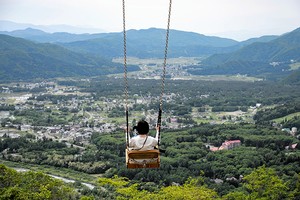REUTERS
September 22, 2023 at 12:40 JST
 A concept model of the Global Combat Air Program (GCAP) fighter jet is displayed at the DSEI Japan defense show at Makuhari Messe in Chiba, east of Tokyo, Japan March 15, 2023. (Reuters Photo)
A concept model of the Global Combat Air Program (GCAP) fighter jet is displayed at the DSEI Japan defense show at Makuhari Messe in Chiba, east of Tokyo, Japan March 15, 2023. (Reuters Photo)
Japan, Britain and Italy plan to choose Britain as the headquarters for their next-generation fighter program, four sources in Japan said, putting London at the forefront of a partnership that could expand to include other nations.
The three countries established the Global Combat Air Program (GCAP) in December after Britain and Japan agreed to merge their fighter efforts in a ground-breaking collaboration that aims to deploy an advanced aircraft by the middle of the next decade.
Japan and Britain will dominate design and manufacturing on the project, with London’s deeper and more recent experience in jet fighter development likely to give it a leading role in organizing the program, said three of the sources, who have knowledge of internal discussions.
“The headquarters will be in Britain, but for the sake of balance, someone from Japan could head it,” said one of the sources, all of whom asked not to be identified because of the sensitivity of the issue.
“Discussion about the headquarters is ongoing and we are unable to comment on the location,” Japan’s defense procurement agency said in an email. A development framework for the fighter would be established in the next fiscal year, it added.
“No final decisions have been made on the locations and we will not comment on speculation,” a spokesperson at Britain’s defense ministry said.
Officials at the Italian defense ministry were unavailable for comment. Reuters in March reported that Italy was set to pay for about a fifth of the overall development cost, which the country’s government dismissed as “speculative.”
OTHER COUNTRIES
On Friday, the head of Italian defense and aerospace group Leonardo said Saudi Arabia would not be a core partner in the project, after the Financial Times last month said it was pushing to join.
GCAP could welcome the country in a more limited role because it would bring money and a lucrative market to a project expected to cost tens of billions of dollars, the three sources said.
One of its neighbors in the Middle East, The United Arab Emirates, has also shown interest, they added. There had been conversations on possibilities with Saudi Arabia, but no decision beyond that, Richard Berthon, director of Future Combat Air at Britain’s Ministry of Defense, said at London’s DSEI arms show last week.
“It was made clear in London that it could possibly come in at a later date,” an Italian defense ministry source said, declining to be identified because they are not authorized to speak to the media.
Britain’s lead company in GCAP is BAE Systems PLC, with Mitsubishi Heavy Industries representing Japan.
European missile maker MBDA will also join the project, along with avionics manufacturer Mitsubishi Electric Corp., Britain’s Rolls-Royce PLC, Japan’s IHI Corp. and Italy’s Avio Aero will work on the engine.




















A peek through the music industry’s curtain at the producers who harnessed social media to help their idols go global.
A series based on diplomatic documents declassified by Japan’s Foreign Ministry
Here is a collection of first-hand accounts by “hibakusha” atomic bomb survivors.
Cooking experts, chefs and others involved in the field of food introduce their special recipes intertwined with their paths in life.
A series about Japanese-Americans and their memories of World War II